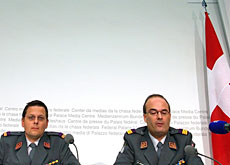Military justice looks into Jungfrau tragedy

Switzerland's military justice has launched a criminal investigation against two mountain guides in the aftermath of the Jungfrau accident that killed six recruits.
Scientific analysis has shown that the soldiers were most probably carried away by an avalanche they triggered themselves as they climbed towards the famous summit in July.
The army’s investigating judge, Christoph Huber, said in Bern on Thursday that given the relatively high avalanche risk, the steep slope and the possible presence of wind slabs, the guides’ decision to proceed with the climb was debatable.
According to Huber, the aim was not to reach the summit, but to start the approach and see first if the climb was feasible. He added that part of the investigation would be to determine if the guides had the necessary information to take the right decision.
There are at least three points along the chosen route where avalanches come down regularly.
Huber pointed out that while an investigation for negligent manslaughter had been opened against the guides, this did not mean that they were guilty. He said they were innocent unless proven otherwise.
“We have to see now… who is responsible for the deaths,” he told swissinfo, adding that the investigation might be widened at a later date to include other people.
The judge could not say how long the criminal investigation would last, especially now that lawyers have become involved in the case.
“It’s not up to me to decide,” he admitted. “I would say in the next few months we have some work to do.”
Questions
The accident, in which the soldiers fell 1,000 metres to their deaths, was the Swiss military’s worst in 15 years. Eight people, including the two guides, were rescued unharmed.
Families of the victims have demanded to know why the group attempted to scale the 4,158-metre Jungfrau peak in the Bernese Oberland despite recent snowfall that heightened the risk of avalanches.
Experts from the Swiss Federal Institute for Snow and Avalanche Research were asked to determine the causes of the accident.
Their report says that the recruits died because of an avalanche, adding that there was no other reasonable explanation. They also believe that the soldiers set off the slide themselves.
“It is unlikely the avalanche was set off by a third party or an animal, and it was probably not spontaneous,” the specialists noted. Given the low temperature at the time of the accident – 10am – softening of the snow by the sun did not play a role either.
Fresh snow
The experts say their version of what happened does not contradict the testimony of one of the surviving soldiers, who thought one of the group had fallen taking the others with him. “It is possible that those climbing at the rear of the group did not realise what started the avalanche,” added Jakob Rhyner, one of the institute’s experts.
The avalanche risk on the day was three on a scale of five, with around 60 centimetres of fresh snow. The accident took place on a slope the specialists consider to be “extremely” dangerous for snow slides.
According to institute statistics, 32 people have been killed by avalanches in the Swiss Alps over the past 36 years in July and August. On a number of occasions, whole groups have been carried away.
They pointed out that snowfall is not unusual at higher altitudes in summer and the avalanche risk is at its highest just afterwards.
swissinfo with agencies
The victims were all part of the Mountain Specialists Division 1 in the Swiss militia army.
To be accepted into the recruit school in Andermatt, members have to fulfil two conditions: completion of a special group leadership course in one of the two fields: ski touring or mountaineering; and obtain marks good to very good in the sport exams that are part of the 3-day conscription to the army.
The main emphasis of training is on avalanche duties, mountain rescue techniques, survival in the mountains, and carrying out redeployment moves in the mountains.
Members of the unit are also taught to act as advisers and trainers.
The unit is expected to be ready to be deployed and operational within 9 hours.
The Swiss army said on Friday that it would not take any measures before the investigation was over.
The head of the land forces Luc Fellay told journalists though that more emphasis would be put on responsibility during the next recruit school for mountain specialists in Andermatt that begins in a few weeks time.
The two guides under investigation are federal employees who have the support of the army according to Fellay, and are continuing to fulfil their functions.

In compliance with the JTI standards
More: SWI swissinfo.ch certified by the Journalism Trust Initiative











You can find an overview of ongoing debates with our journalists here . Please join us!
If you want to start a conversation about a topic raised in this article or want to report factual errors, email us at english@swissinfo.ch.